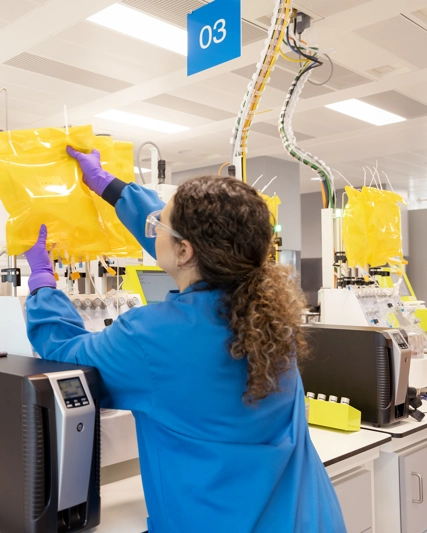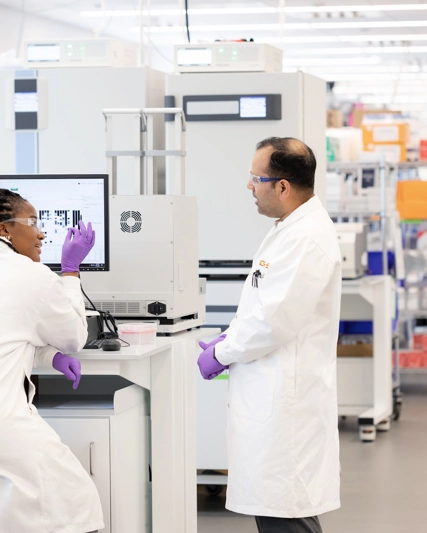Oncology
Cancer is unrelenting, but so are we. We aim to push the boundaries of innovation to transform what’s possible in cancer care – to modify the course of disease, redefine patient outcomes and ultimately, help prevent cancer before it starts.
Outsmarting cancer demands focus
Driving progress through targeted medicines
Cancer remains one of the world’s most pressing health challenges, with one in five people diagnosed in their lifetime. Despite medical advances, the global survival rate across all cancers remains at around 69%. This underscores the urgent need for innovations that could improve quality of life, long-term survival and outcomes for patients.
To get ahead of cancer, we focus where we can make a significant and meaningful difference. Our focus on precision medicine-based technology is helping us to deepen our understanding of the genetic drivers of cancer and identify new ways to match the right treatment to the right patient. Through our growing portfolio and promising pipeline, we aim to intervene earlier in the disease process and redefine standards of care for patients.
We’re advancing a diverse and innovative oncology pipeline including tumour-targeting technologies such as antibody-drug conjugates (ADCs), next-generation small molecules, and T-cell engagers. By combining our deep expertise in human genetics and the science of the immune system with strategic partnerships and business development, we aim to develop new treatment options that address multiple patient populations and stages of cancer therapy. Our goal is to make a meaningful difference for patients with cancer while continuing to expand our research and development efforts.
Blood cancers
Multiple myeloma is the third most common blood cancer globally, with around 180,000 new cases diagnosed annually. While it is generally considered treatable, it is not curable, and patients face a relentless cycle of relapse and resistance to therapy.
Our goal is to expand treatment options for multiple myeloma patients across all lines of therapy. We are exploring innovative solutions to help address current treatment challenges and deliver improved outcomes.
Myelofibrosis is a rare blood cancer where excessive scar tissue builds up in the bone marrow, interfering with the production of healthy blood cells. Nearly all myelofibrosis patients eventually develop anaemia and require regular blood transfusions.
In the US alone, myelofibrosis affects around 25,000 patients, and around 30% of patients stop treatment because of anaemia. Myelofibrosis patients who are anaemic and dependent on transfusions face poor prognosis and shortened survival rates. Using advanced technologies and our expertise in haematology, we aim to address these unmet needs to improve outcomes for patients living with this debilitating disease.
Gynaecologic cancers
We are working towards breakthroughs in the treatment of diseases such as endometrial cancer and ovarian cancer.
Endometrial, or uterine, cancer is the sixth most common cancer in women worldwide, and incidence rates are expected to rise by almost 40% between 2020 and 2040. With around 19% of patients surviving five years in certain advanced settings, there is a critical need for new treatment options. Our research is focused on identifying specific biomarkers and generic vulnerabilities associated with endometrial cancer to develop therapies that address the underlying mechanisms of the disease.
Ovarian cancer is the eighth most common cancer worldwide. Globally, more than 200,000 women die with the disease every year (GLOBOCAN 2022). Ovarian cancer is often diagnosed at a later stage, which leads to high occurrence rates and poorer outcomes. We are researching how certain approaches could help to optimise treatment outcomes for those newly diagnosed or living with advanced ovarian cancer, aiming to improve survival and quality of life.
Continuing advances in immuno-oncology
Immuno-oncology harnesses the power of the immune system to fight against cancer. While significant progress has been made for patients with many types of cancer, continued research is essential to realise its impact.
We are actively exploring the potential of investigational medicines designed to help the immune system recognise and kill cancer cells more effectively. Our research focuses on identifying the right biomarkers and patient subpopulations to help improve outcomes. We are also investigating the potential of precision medicine-based technology, with the aim to deliver treatments that match each patient’s needs, improving outcomes and enhancing quality of life.






